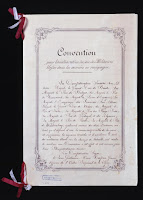Documents from the Department of Personal Information (Abteilung PA) on the First and Second World War (formerly Wehrmachtauskunftstelle [WASt])
The German Office (WASt) was transferred to the Federal Archives (Abteilung PA) on January 1, 2019. Here we give an overview of the history, stocks and tasks of the department.
December 18, 2019
Takeover and evaluation
Use
Archive holdings of the Abteilung PA
Personnel documents of the Wehrmacht
Source: Federal Archives / Kirchhoff, Peter
The holdings taken over by the Deutsche Dienststelle (German Agency) into the Federal Archives have a volume of approx. 75,000 running meters. These are almost exclusively personal documents, especially reports that contain lists or have been recorded in extensive files.
Central register of persons.
The core of the information provided by the Abteilung PA is the approx. 150 million loss reports collected in the WASt or the Deutsche Dienststelle, including reports of missing military units and medical formations, as well as the approx. 100 million change reports by name in the dog tags lists from 1939 to 1945. During the war, an index card was created for each individual to be stored by the Central Register of Persons (Z-Kartei). The Central Register today contains information on more than 18.5 million members of the former German Wehrmacht and other military-like associations.Grave register
After the WASt's burial register was considered lost after the end of the war, the Deutsche Dienststelle created a so-called replacement burial register based on available information, which has now grown to around 4.5 million cards. However, in the course of the unification process in 1990, the original burial register was found in the Dornburg branch of the Central State Archives of the GDR and handed over to the Deutsche Dienststelle.Documents on prisoners of war.
After the end of the war, documents which the WASt had kept about prisoners of war in German custody were confiscated and handed over to the respective countries of origin of the prisoners of war.From 1950 onwards the Deutsche Dienststelle received from the western victorious powers (i.e. from Great Britain, France, Belgium and the USA), documents about German prisoners of war and internees. Most of these were personnel sheets, files and dossiers with a total of approximately 15 million reports. Documents on German prisoners of war and internees in Soviet custody were not handed over to the German Agency. However, around 945,000 index cards of the returnees' camps Waldschänke, Hof-Moschendorf, Tuttlingen, Frankfurt / Oder-Gronenfelde and Pirna / Saxony have survived.
Documents on members of the Navy
In 1949 and 1950, the Deutsche Dienststelle received marine personnel files, which begin in the second half of the 19th century. They are supplemented by the naval master role register and the duty merchant seafarers identification tag and other personnel documents.Growth since 2005.
When the central archive of the Federal Archives in Aachen-Kornelimünster was dissolved, part of the holdings was handed over to the Deutsche Dienststelle. This was primarily a collection of approximately 4,000,000 personnel documents, namely military records of non-commissioned officers and regular recruits.Between 2009 and 2017, the Deutsche Dienststelle successively received more than 10 million individual personal reports (including medical records and health books) as well as the sick and hospital books, in particular. of the First and Second World War from the Berlin Hospital Book Storage, which in turn took over the inventory of the Hospital Book Storage in Kassel and Munich in 1964.





















